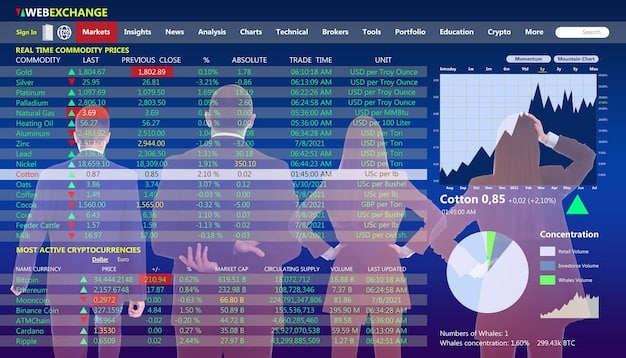Maximize Your Refund: Earned Income Tax Credit Strategies for 2025

The Earned Income Tax Credit (EITC) is a significant benefit for low- to moderate-income workers and families, offering a chance to increase their tax refund in 2025 by understanding eligibility criteria, optimizing income reporting, and claiming all qualifying dependents and credits.
Maximize your tax refund in 2025 by understanding and leveraging the Earned Income Tax Credit: Increase Your Refund in 2025 with These Strategies. The EITC is designed to help individuals and families with low to moderate income, offering a substantial financial boost during tax season.
Understanding the Earned Income Tax Credit (EITC)
The Earned Income Tax Credit (EITC) is a refundable tax credit in the United States. It’s designed to supplement the income of low- to moderate-income working individuals and families. Understanding the basics of the EITC is the first step to maximizing your potential refund.
What is the EITC?
The EITC is essentially a government subsidy for workers who don’t earn high incomes. It reduces the amount of tax owed and can result in a refund, even if you didn’t pay any taxes during the year. The amount of the credit depends on your income, filing status, and the number of qualifying children you have.
Who is Eligible for the EITC?
Eligibility for the EITC depends on several factors, including your income, filing status, and whether you have qualifying children. There are also certain rules about residency, age, and whether you can be claimed as a dependent on someone else’s return. Generally, you must have earned income and meet specific income limits, which vary each year.

- Meeting income thresholds based on filing status and number of children.
- Having a valid Social Security number.
- Being a U.S. citizen or resident alien.
- Not being claimed as a dependent by someone else.
In conclusion, the EITC provides valuable support to low- to moderate-income workers, and understanding the basic requirements is cruicial to maximizing your refund.
Key Changes to the EITC for 2025
Staying informed about any changes to the Earned Income Tax Credit (EITC) is essential to accurately calculate your potential refund. Tax laws and regulations can evolve, impacting eligibility criteria, income thresholds, and the overall credit amount. Here’s what you need to know about the key changes expected for the EITC in 2025.
Potential Legislative Updates
Tax laws undergo revisions each year, and these updates can directly affect the EITC. Congress might introduce new legislation that changes the income thresholds, the maximum credit amount, or eligibility rules. Staying abreast of these changes can help you plan your tax strategy effectively. Consult IRS publications and reputable tax websites for the latest updates.
Adjustments for Inflation
The IRS typically adjusts various tax provisions for inflation annually, including the EITC income thresholds. These adjustments are designed to prevent inflation from eroding the value of the credit. For 2025, expect updated income limits that reflect the current economic environment. These adjustments will help more people qualify for the credit and ensure the credit remains relevant.

Impact on Eligibility and Credit Amount
The changes for 2025 will likely impact both who is eligible for the EITC and the amount of the credit they can receive. Higher income thresholds mean more people can qualify, while changes to the credit amount can affect the overall financial benefit. Always refer to the official IRS guidelines and use updated tax preparation tools to ensure accuracy.
In conclusion, knowing the recent changes to the EITC rules for 2025 allows you to better estimate your potential refund amount. Stay informed to make the most of this valuable tax credit.
Maximizing Your EITC Refund: Strategies and Tips
To truly maximize your Earned Income Tax Credit (EITC) refund, it’s not enough to simply meet the eligibility criteria. Strategic planning and attention to detail can make a significant difference in the amount you receive. Here are some actionable strategies and tips to help you boost your EITC refund in 2025.
Accurately Reporting All Income
One of the most critical steps in maximizing your EITC refund is to ensure that you accurately report all sources of income. This includes wages, self-employment income, tips, and any other earnings you receive throughout the year. Underreporting income can lead to penalties and reduce the amount of credit you are eligible for.
Claiming All Qualifying Dependents
The EITC is more generous for those who have qualifying children. Make sure you claim all eligible dependents on your tax return. A qualifying child must meet certain relationship, age, residency, and joint return tests. Keep detailed records and documentation to support your claims.
- Keep accurate records of all income sources.
- Ensure all dependents meet the eligibility criteria.
- Seek professional advice for complex tax situations.
The key to maximizing your credit is to ensure both income and dependents are declared correctly.
Common Mistakes to Avoid When Claiming the EITC
Claiming the Earned Income Tax Credit (EITC) can be a straightforward process, but it’s also easy to make mistakes that can delay your refund or even result in penalties. Being aware of common errors and taking steps to avoid them is essential for a smooth and accurate tax filing experience. Here are some frequent pitfalls to watch out for when claiming the EITC.
Incorrectly Calculating Income
One of the most frequent mistakes is miscalculating your income. This can happen if you forget to include all sources of earnings, such as self-employment income or tips. Make sure you have all the necessary documents, like W-2s and 1099s, and double-check your calculations to ensure accuracy.
Failing to Meet Residency Requirements
To claim the EITC, you must meet certain residency requirements. Generally, you must live in the United States for more than half of the tax year. Failing to meet this requirement can disqualify you from receiving the credit. Make sure you can document your residency if needed.
Falling for scams can be extremely detrimental and prevent you from getting the refund you are entitled to.
- Carefully review all income documents.
- Ensure you meet all residency criteria.
- Avoid falling for EITC scams and misinformation.
Avoiding these pitfalls can save you from potential issues and prevent any delays in your tax payment.
The Impact of Self-Employment Income on the EITC
Self-employment income can have a significant impact on your eligibility for the Earned Income Tax Credit (EITC). Understanding how to properly report self-employment income and how it affects your EITC claim is crucial for maximizing your tax benefits. Here’s what you need to know about the relationship between self-employment income and the EITC.
Reporting Self-Employment Income Accurately
Reporting self-employment income can be more complex than reporting wages from an employer. You’ll need to report all income you receive from your business, but you can also deduct business expenses. Accurate record-keeping is essential. Keep detailed records of all income and expenses, and use Schedule C (Form 1040) to report your profit or loss from business.
Deducting Business Expenses to Lower AGI
One of the key strategies for maximizing your EITC when you have self-employment income is to deduct all eligible business expenses. Lowering your Adjusted Gross Income (AGI) can increase the amount of EITC you are eligible for. Common business expenses include supplies, travel, advertising, and business-related education. Make sure you keep receipts and documentation for all expenses.
Understanding the nuances of self-employment income will allow you to navigate the eligibility rules accordingly.
- Maintain meticulous records of all business transactions.
- Deduct all eligible business expenses to lower AGI.
- Consult with a tax professional for personalized advice.
Resources for EITC Assistance and Information
Navigating the complexities of the Earned Income Tax Credit (EITC) can be challenging, and it’s helpful to know where to turn for assistance and reliable information. Various resources are available to provide guidance, answer your questions, and help you accurately claim the EITC. Here are some key resources for EITC assistance and information.
IRS Free File Program
The IRS Free File program offers free tax preparation software for eligible taxpayers. If your income is below a certain threshold, you can use brand-name software to prepare and file your taxes online for free. This can be a valuable resource for ensuring accuracy and maximizing your EITC refund.
Volunteer Income Tax Assistance (VITA)
Volunteer Income Tax Assistance (VITA) programs provide free tax help to people who generally make $60,000 or less, persons with disabilities, and taxpayers who have limited English proficiency. VITA sites are located in communities across the country and are staffed by IRS-certified volunteers who can help you with your tax return.
Leverage resources that are available through tax professionals to make informed decisions so there is no confusion down the line.
- Utilize the IRS Free File program for free tax software.
- Seek assistance from VITA volunteers for personalized help.
- Consult the IRS website for official publications and guidance.
| Key Aspect | Brief Description |
|---|---|
| 💰 EITC Overview | Learn about the Earned Income Tax Credit and its benefits for low- to moderate-income workers. |
| ✅ Eligibility | Understand income, filing status, and dependent qualifications to receive the EITC. |
| 📈 Maximizing Refund | Strategies to accurately report income and claim eligible dependents for a higher refund. |
| 💼 Self-Employment | Tips for self-employed individuals to accurately report income and expenses for EITC. |
Frequently Asked Questions (FAQ)
▼
The EITC is a refundable tax credit for low- to moderate-income working individuals and families. It reduces the amount of tax you owe and may give you a refund.
▼
Eligibility depends on your income, filing status, and the number of qualifying children you have. You must also meet certain residency and age requirements.
▼
Accurately report all income, claim all qualifying dependents, and take advantage of available tax preparation resources to ensure you get the maximum credit.
▼
Avoid miscalculating income, failing to meet residency requirements, and falling for EITC scams. Double-check all information before filing your tax return.
▼
Resources include the IRS Free File program, Volunteer Income Tax Assistance (VITA) sites, and IRS publications. These can provide valuable guidance and support.
Conclusion
Understanding and strategically leveraging the Earned Income Tax Credit (EITC) can significantly boost your financial well-being. By staying informed about eligibility criteria, accurately reporting income, and claiming all qualifying dependents, you can maximize your EITC refund and secure valuable financial assistance in 2025.





